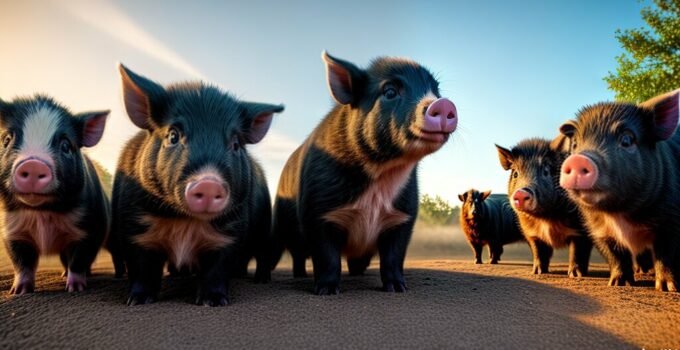While dogs and cats may be the most common household pets, pet pigs are gaining popularity with families. Pigs are highly intelligent, sociable, and affectionate animals that can make great family companions. However, not all pig breeds are suitable for family life, and it is essential to find the perfect fit for your family’s lifestyle and living situation.
In this article, we will explore the top pet pig breeds suitable for families, discuss important considerations before bringing a pet pig home, and offer tips for caring for a pet pig in a family setting.
Key Takeaways:
Pet pigs can make great family companions due to their intelligence, sociability, and affectionate nature.
Not all pig breeds are suitable for family life, and it’s essential to research and find the perfect fit for your family.
Important considerations before getting a pet pig include legal restrictions, zoning regulations, and the commitment required for their care and well-being.
Caring for a pet pig in a family setting requires proper diet, exercise, socialization, and veterinary care.
What to Consider When Choosing a Pet Pig Breed for Your Family
When it comes to choosing a pet pig breed for your family, there are several factors to consider. Pig breeds can vary greatly in size, temperament, lifespan, and exercise needs, which can all impact their suitability as a family pet. To ensure that you find the best pig breed for your family, it is important to do your research and carefully consider these factors.
Size: One of the most important factors to consider when choosing a pet pig breed for your family is size. While many pig breeds are small enough to live comfortably in a home, some can grow to be quite large. It is important to choose a breed that is appropriate for the size of your home and yard, as well as your ability to provide adequate exercise and care.
Temperament: Pig breeds can also differ in temperament, ranging from docile and calm to more active and adventurous. It is important to choose a breed that matches your family’s personality and lifestyle. For example, if you have young children, you may want to choose a breed that is known for being gentle and friendly.
Lifespan: Another consideration when choosing a pet pig breed is lifespan. Some breeds can live up to 20 years, while others have a shorter lifespan of around 10 years. It is important to consider the long-term commitment that comes with owning a pet pig and to choose a breed that fits your family’s lifestyle.
Exercise Needs: Finally, it is important to consider the exercise needs of your chosen pig breed. Some breeds require more exercise than others, and it is important to ensure that you can provide enough space and opportunities for your pig to stay active and healthy. Additionally, some breeds may require a special diet or medical care, which should also be taken into consideration when choosing a pig breed.
What to Consider When Choosing a Pet Pig Breed for Your Family:
| Factor | Considerations |
|---|---|
| Size | Choose a breed appropriate for your home and yard size, as well as your ability to provide exercise and care |
| Temperament | Choose a breed that matches your family’s personality and lifestyle |
| Lifespan | Consider the long-term commitment of owning a pet pig and choose a breed that fits your family’s lifestyle |
| Exercise Needs | Ensure that you can provide enough space and opportunities for your pig to stay active and healthy, and consider any special diet or medical needs |
By carefully considering these factors, you can choose the best pet pig breed for your family, ensuring a happy and healthy life for both your family and your new furry friend.
Potbellied Pig
The Potbellied Pig breed is one of the most popular pig breeds for families. They are intelligent, social, and easy to train, making them a great fit for households with children. Potbellied Pigs are also highly adaptable to indoor living and can even be litter trained.
One of the advantages of having a Potbellied Pig as a family pet is their size. They typically weigh between 100-150 pounds and stand at around 1-1.5 feet tall, making them smaller than other domestic pig breeds. This makes them suitable for families living in smaller spaces without a yard.
| Traits | Details |
|---|---|
| Temperament | Potbellied Pigs are intelligent, affectionate, and enjoy interacting with people. They can be trained to do tricks and respond well to positive reinforcement. |
| Size | Potbellied Pigs are smaller than traditional pig breeds, typically weighing between 100-150 pounds and standing between 1-1.5 feet tall. |
| Care Requirements | Potbellied Pigs require a balanced diet, regular exercise, and annual veterinary check-ups. They should also be spayed or neutered to reduce aggression and prevent unwanted litters. |
It’s important to note that while Potbellied Pigs are generally good with children, they still require supervision and socialization to ensure a harmonious family life. Proper training, especially during their first few months in a new home, can help establish a strong bond with their human family.
Juliana Pig
The Juliana Pig is a small-sized pig breed that is known for its friendly and sociable nature, making them a suitable pet for families. Originally from South America, the Juliana Pigs were bred from a mix of wild boars and domestic pigs. They are one of the smallest pig breeds, growing up to 16 inches in height and 65 pounds in weight.
| Traits | Description |
|---|---|
| Temperament | Juliana pigs are known for their friendly and loving temperament. They are social animals that enjoy human company and are very affectionate. They are suitable for families with children and get along well with other pets. |
| Size | Juliana Pigs are small-sized pigs that grow up to 16 inches in height and 65 pounds in weight. They are easy to handle and maintain. |
| Care Requirements | Juliana Pigs are relatively low maintenance and have minimal grooming needs. They can adapt to both indoor and outdoor environments but require a safe and suitable living space. They also need a balanced diet and regular exercise to maintain their health and well-being. |
Juliana Pigs are intelligent and highly trainable, making them suitable for families who are willing to invest time in their proper training and socialization. They are also known for their playful and curious nature, which can provide endless entertainment for families.
American Mini Pig
The American Mini Pig is a popular breed for families due to its friendly nature and adaptability to both indoor and outdoor environments.
These pigs are known for their social nature, and they often form strong bonds with their owners. They are also compatible with children, making them a great addition to a family household.
One of the key benefits of the American Mini Pig is their small size, which makes them suitable for smaller living spaces. They are also relatively low maintenance, requiring only basic care such as regular grooming and nail trimming.
Despite their small size, American Mini Pigs still require regular exercise and mental stimulation to keep them healthy and happy. They enjoy a variety of activities such as walks, playtime, and even simple training exercises.
Overall, the American Mini Pig is an excellent choice for families looking for a friendly and social pet that is easy to care for and adaptable to their living situation.
Micro Pig
The Micro Pig is a popular pet pig breed suitable for families, especially those living in smaller spaces. They are known for their small size, typically weighing between 40 to 60 pounds, and their easy-to-maintain nature.
Micro Pigs are highly intelligent and sociable, making them excellent companions for families with children. However, they require regular exercise and mental stimulation to prevent boredom and destructive behavior. It is recommended to provide them with an outdoor space to roam, but they can adapt to indoor living as well.
As with all pet pigs, it is important to provide the appropriate care and attention for a Micro Pig. They require a balanced diet consisting of high-quality pig feed, fresh fruits, and vegetables. They also need regular veterinary check-ups and socialization to ensure a happy and healthy life with their family.
Pet Pig Breeds Suitable for Families: Vietnamese Potbellied Pig
The Vietnamese Potbellied Pig is a popular pet pig breed among families due to its intelligence, sociability, and adaptability. This breed originated in Vietnam and was imported to the United States in the 1980s as a novelty pet. They are known for their small size, typically weighing between 100 and 200 pounds, and their unique appearance, with a round belly, erect ears, and a short snout.
Unlike some other pig breeds, Vietnamese Potbellied Pigs are highly trainable and respond well to positive reinforcement. They are also known for their affectionate nature and love for human interaction. This makes them a great companion for families with children who are looking for a pet that can bond well with the entire family.
| Temperament | Size | Care Requirements |
|---|---|---|
| Intelligent, sociable, and trainable. Requires proper training and socialization for harmonious family living. | Small size, typically weighing between 100 and 200 pounds. | Requires a suitable living environment with regular exercise and mental stimulation. Diet should consist of a balanced and nutritious pig feed, with occasional treats. |
It is important to note that owning a Vietnamese Potbellied Pig requires a significant commitment in terms of time, effort, and financial resources. They can live up to 15-20 years and require regular veterinary check-ups, vaccinations, and deworming. Families should also research any legal and zoning restrictions in their area before bringing a Vietnamese Potbellied Pig into their home.
Overall, if properly cared for and trained, the Vietnamese Potbellied Pig can make a wonderful addition to any family looking for a unique and affectionate pet.
The Benefits of Having a Pet Pig as a Family Companion
Having a pet pig can bring many benefits to a family. These unique animals are not only adorable and affectionate, but they are also low allergenic, hypoallergenic, and have a strong desire to bond with their human family.
One of the most significant benefits of having a pet pig is their ability to form strong bonds with humans, especially children. Pig breeds suitable for families are known for their affectionate nature, and they love nothing more than to cuddle and engage in playtime with their human counterparts.
Another advantage of having a pet pig is their low allergenic properties. They have hair instead of fur, making them an excellent pet option for people with allergies. Additionally, owning a pet pig can teach children about responsibility and empathy as they learn to care for and nurture their pet.
It is important to note that not all pig breeds make suitable pets for families. Before bringing a pet pig into your home, research the pig breeds that are known for their friendly nature, adaptability, and compatibility with children.
Important Considerations Before Getting a Pet Pig
While pet pigs can make wonderful family companions, there are important considerations to keep in mind before bringing one into your home.
First, it’s important to research local and state laws regarding pet pigs. Some areas have restrictions on owning pigs, and it’s important to ensure you are in compliance with any regulations. Additionally, zoning regulations may dictate the type and number of animals you can keep on your property.
It’s also important to consider the commitment required for caring for a pet pig. Pigs can live up to 20 years and require daily care, including feeding, exercise, and socialization. Families must be prepared to provide for their pig for its entire lifespan.
Proper housing is also essential for a pet pig. They require a clean, dry, and warm environment that is safe and secure. Owners must be prepared to clean their pig’s living area regularly and provide appropriate bedding and shelter.
Lastly, it’s important to consider the financial implications of owning a pet pig. Pigs require regular veterinary care, including vaccinations and routine check-ups, and may have additional medical needs as they age. Families must be prepared to cover these costs in addition to the ongoing cost of food and supplies.
Tips for Caring for a Pet Pig in a Family Setting
Bringing a pet pig into your family requires careful consideration and planning to ensure their physical and emotional well-being. Here are some tips to help you provide the best care for your pet pig:
Diet
Pet pigs require a balanced diet to maintain good health. Feed your pet pig a diet of quality pellets, supplemented with fresh fruits and vegetables. Avoid feeding them human foods, junk food, or high-fat foods that can lead to obesity and other health issues.
Exercise Routine
Your pet pig needs regular exercise to maintain good health. They should have access to outdoor space and an area to move around freely indoors. Take them for daily walks, play with them, and provide toys for mental stimulation. Note that long periods of inactivity can cause health issues, such as obesity and joint problems.
Socialization Needs
Like dogs and cats, pet pigs require socialization to develop positive behavior and form bonds with family members. Encourage positive interactions with people and other pets. Consider taking your pet pig to training classes to teach them basic commands and good manners.
Basic Training
Basic training is essential to help your pet pig adjust to living in a family setting. Teach them basic commands such as sit, stay, come, and leave it. Reward good behavior with praise and treats, and avoid using punishment or negative reinforcement.
Veterinary Care
Your pet pig requires regular veterinary care to maintain good health. Schedule regular check-ups with a veterinarian who has experience with pet pigs. Vaccinations, deworming, and spaying/neutering are also essential to maintain their health.
Suitable Living Environment
Ensure that your pet pig has a suitable living environment that provides adequate space, shelter, and protection from extreme weather conditions. Provide a comfortable bed, and keep their living areas clean and hygienic. Ensure they have access to fresh water at all times.
By following these tips, you can provide a safe and happy home for your pet pig. Remember that pet pigs require a significant commitment of time, effort, and financial resources, so ensure you are ready to take on this responsibility before bringing a pet pig into your family.
Conclusion
In conclusion, pet pigs can make wonderful family companions, but it is important to choose the right breed for your family. Potbellied pigs, Juliana pigs, American mini pigs, micro pigs, and Vietnamese Potbellied pigs are some of the most suitable breeds for families. They are friendly, social, and highly adaptable to indoor living.
Having a pet pig can benefit your family in many ways, including teaching children responsibility and empathy. However, before getting a pet pig, it is essential to consider important factors such as legal restrictions and zoning regulations. Conducting thorough research is highly recommended before making a decision.
Caring for a pet pig in a family setting can be rewarding but requires a commitment to their care and well-being. Feeding them a healthy diet, providing regular exercise, socialization, and proper training are crucial aspects of their care. Additionally, suitable living environments and regular veterinary care are essential.
In short, pet pigs can bring joy and love to a family, but it is important to choose a breed that is compatible with your lifestyle, space availability, and commitment level. With proper care, a pet pig can become an integral part of your family and provide years of happiness.
FAQ
Q: What factors should families consider when choosing a pet pig breed?
A: Families should consider factors such as size, temperament, lifespan, and exercise needs when choosing a pet pig breed. Different pig breeds may have varying suitability for families based on these factors.
Q: What is the Potbellied Pig breed like?
A: Potbellied Pigs are known for their intelligence and adaptability to indoor living. They have a friendly temperament and require proper care and attention.
Q: What are the characteristics of the Juliana Pig breed?
A: Juliana Pigs are small in size and have a friendly nature, making them suitable for families with children. They have low maintenance needs and can adapt well to indoor living.
Q: What is the American Mini Pig breed like?
A: American Mini Pigs are small in size and have a friendly temperament. They are adaptable to both indoor and outdoor environments and are known for their social nature, making them suitable for families.
Q: What is the Micro Pig breed known for?
A: Micro Pigs are known for their small size and easy-to-maintain nature. They are suitable for families, especially those living in smaller spaces, but require regular exercise and mental stimulation.
Q: What are the characteristics of the Vietnamese Potbellied Pig breed?
A: Vietnamese Potbellied Pigs are intelligent, sociable, and adaptable. They require proper training and socialization for a harmonious family life, and their size and care requirements should be considered.
Q: What are the benefits of having a pet pig as a family companion?
A: Having a pet pig as a family companion can bring affection, as they are known for their loving nature. They also have low allergenic properties and can form strong bonds with humans, especially children. Pet pigs can teach children responsibility and empathy.
Q: What important considerations should families keep in mind before getting a pet pig?
A: Families should consider legal restrictions, zoning regulations, and the commitment required for the care and well-being of a pet pig. Thorough research is needed before making a decision.
Q: What tips can you provide for caring for a pet pig in a family setting?
A: For caring for a pet pig in a family setting, it is important to consider their diet, exercise routine, socialization needs, and basic training. Veterinary care and a suitable living environment are also important for their well-being.



